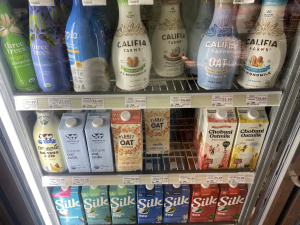
Oat milk in its natural habitat / Scarlett Coffey
I go into a coffee shop, and I examine the menu, make a careful selection, while the barista stares exasperatedly at me waiting for a decision. After I announce my drink–matcha usually–I am asked the dreaded question: “What kind of milk would you like with that?”
I know exactly what kind of milk I want, whole milk, but that is not supposed to be what I say. I should think about the environment, think about the water and land usage, and the emissions that cows put off simply by existing. I have seen the graphs, I know how badly dairy cows are treated and that most of the food that farms produce in America go to feeding cattle, either for meat or various dairy products.
So, I end up getting an oat milk matcha latte, pressured by the imaginary voices in my head, when in reality the barista just wants to get on with their day, not caring if I pay fifty cents more for my matcha. And on top of the perceived judgement there is the question if I have really made a difference by buying oat milk instead, or if I am torturing myself over nothing.
Oat milk is everywhere; it is one of the best options environmentally, and it has been marketed very well. Whether it is Oatly or Califa or another Big Oatmilk company creating queer stereotypes one latte at a time the oat milk drinkers are everywhere. I can say, in my limited experience as a barista, that it definitely sells the best out of the alternative milks. Of course it is not just the environmentalists buying the alternative milks but lactose intolerant people who have also been driven into the arms of Big Oatmilk.
All of this makes sense to me, caring about the environment, or simply not being able to handle cows milk, but what really confuses me are the people who enjoy the taste of oat milk. Oat milk, and most alternative milks taste like watered down versions of the grain or nut that they come from. Why would you want to drink something that tastes like sad oatmeal, without other motivations?
The ubiquitous oat milk is a giant that cannot be killed, and does not need to be. It is important to put your money where your mouth is with environmentalism. Not buying products that directly affect climate change is an essential part of this. The internal conflict of comfort versus combating climate change is a tough one to fight. Should I make an attempt, regardless of effectiveness, to mitigate climate change, even if it makes my stomach hurt? I am perfectly comfortable giving up cars, but only because I do not personally like cars, but the thought of giving up the whole milk that I have been raised drinking? Detestable.
I do think that to live in a carbon neutral world, or at least one that is not directly causing the Earth to combust, we have to give up some of what we are used to. However, the people that need to change the most are not you or I, but the billionaire CEOs whose carbon footprint I could not match if I tried. Do not let unethical dairy companies put the blame back on the consumer, and blame you for using the products that they make. It is their fault for making the product in the first place, not yours. Make choices when you can, and be informed when you cannot.
